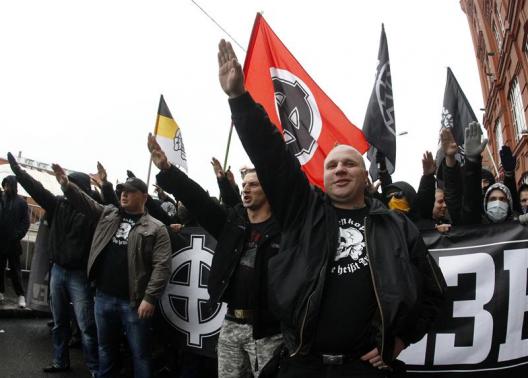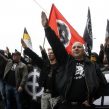
The Involvement of Russian Ultra-Nationalists in the Donbas Conflict
Publication: Eurasia Daily Monitor Volume: 11 Issue: 105
By:

Several cities in Donbas, the eastern portion of Ukraine comprising the regions of Donetsk and Luhansk, have been embroiled in Russian-sponsored secessionist violence against Ukrainian authorities since early April 2014. And while Russia has no officially identified uniformed troops in the region, there are claims that it has been involved in the fighting through the deployment of irregulars, like the Chechen Vostok battalion (see EDM, May 30). Other irregular forces have also been involved, such as hardline Russian nationalists. Now it appears there are connections to the most extreme nationalists, Russia’s neo-Nazi movement. Posting on Facebook, Alexander Belov, the leader of the banned Movement Against Illegal Immigration (known by its Russian acronym DPNI), announced the death in Donetsk of Sergei Vorotsev. Vorotsev was a former organizer for the DPNI in the Moscow Region town of Korolev (Official Facebook page of DPNI, June 4). According to the same posting, Vorotsev was killed in the battle for the Donetsk airport.
The presence of a former member of the DPNI in eastern Ukraine is not entirely surprising, but it does suggest a merging of the goals of such movements and of the Russian regime. Similarly, other neo-Nazi groups have also tried to become involved in the Ukrainian crisis, with the group “Sputnik and Pogrom” organizing humanitarian aid for those ethnic Russians affected by the fighting in the region. A banner bearing the slogan “Donbas says thank you” was posted on their site to thank all those who had donated financial aid (sputnikipogrom.com). On another neo-Nazi website (officially banned in Russia but purportedly hosted on servers in the United States to prevent closure by the Kremlin), that of the skinhead gang “Slavyansky Soyuz” (Slavic Union), there is a call for Russia to start arming the separatists or even to provide more substantial aid due to the disproportionate array of forces deployed against them by the government in Kyiv (https://www.demushkin.com/content/news/222/8964.html). Finally, an individual from the “Russkiye” ethno-political movement, which grew out of the 2011 protests against United Russia and the reelection of President Vladimir Putin (and whose membership overlaps with many other neo-Nazi gangs), expressed condolences on May 18 to the families of those killed in the fighting in Donbas, saying that “we must prepare ourselves for new victims” (https://www.dpni.org/articles/vazhnoe/39003/).
It also seems that the extreme nationalists have renounced their position in the Russian political opposition movement. Illustratively, the calls by some nationalists for a “new Manezh” (street protest) against Putin on May 18 were dismissed by most Far Right leaders as a provocation (https://www.sova-center.ru/racism-xenophobia/publications/2014/06/d29635/). This evidence strongly suggests, therefore, the Kremlin has now co-opted the neo-Nazi movement.
Nevertheless, the Russian Far Right’s involvement in Donbas has consequences for the unity of other irregular forces who are supporting the separatists in eastern Ukraine. Specifically, not all the Russian neo-Nazis were happy with the prospect of working with other elements—especially the Chechens—in the fight for eastern Ukraine. On DPNI leader Belov’s Facebook page, for instance, there were comments, presumably from other neo-Nazis, deriding the involvement of the Chechens. Indeed, Belov himself posted commentary on the DPNI website complaining that Chechens were in Donbas “with [Chechen leader Ramzan] Kadyrov’s blessing and for money” and not out of reasons of patriotism or ethnic belonging (https://www.dpni.org/articles/novostnaya/39200/). This was despite the denials from Chechen president and Kremlin appointee Kadyrov that he had directed any Chechens to go to Donbas. Ethnic-Russian nationalists question the commitment of the Chechens and other North Caucasians to the cause of “Novorossiya” (“New Russia,” a vision declared by Vladimir Putin on April 17 calling for bringing southeastern Ukraine under some form of Russian control—see EDM, May 1). Rather, many ethnic Russians perceive people from the Caucasus as foreign at best and all too often as hostile aliens. Indeed, there has been a spate of race riots against people from the Caucasus in Russia in recent times (see EDM, March 5), which presumably was something the organizers of the May 18 rally were trying to provoke. It is tempting to conclude that the irregular Russian juggernaut now fighting in eastern Ukraine is held together by its common goals, but it will have to keep winning future victories or it will dissolve in internal squabbling.
The evidence that the Kremlin is working with neo-Nazi or ultranationalist forces in Donbas is highly ironic but not surprising. The regime’s allies in the Russian Far Right make the Kremlin’s warnings of a “neo-Nazi” takeover in Kyiv seem even more incredulous. Ostensibly, it was concerns over the role of the Ukrainian neo-Nazi group “Right Sector” and its leader Dmitri Yarosh in the new government that served as justification for the Russian government to annex Crimea. Kremlin propaganda from the time told of mass shootings carried out by Right Sector and even broadcast what it alleged to be photographs of corpses lying in freshly-dug mass graves (https://antimaydan.info/2014/03/lider_neonacistskoj_gruppirovki_pravyj_sektor_dmitrij_yarosh_zayavil__37446.html). While, Right Sector has indeed been involved in a number of violent actions in Ukraine such as an April 2014 attack on a court and judge in the country (https://novorossy.ru/news/news_post/pravyy-sektor-zahvatil-verhovnyy-sud-ukrainy-a-nakazhut-yugo), the fact that the Kremlin is working with its own domestic neo-Nazi movement makes its claims seem all the more disingenuous.
The Russian Far Right’s involvement in the Ukraine crisis and its growing ties to the Kremlin also provide a warning of how volatile the current situation is inside Russia itself. If such trends continue, the next Kremlin occupant could very well be openly sympathetic to the Russian neo-Nazi movement, and such an outcome would truly be a dire situation for the country, Eurasia and the world (see EDM, February 13, 2012).




